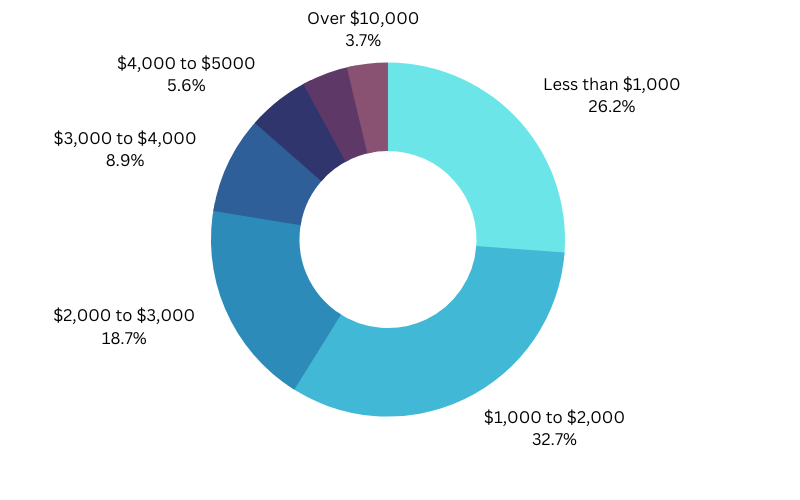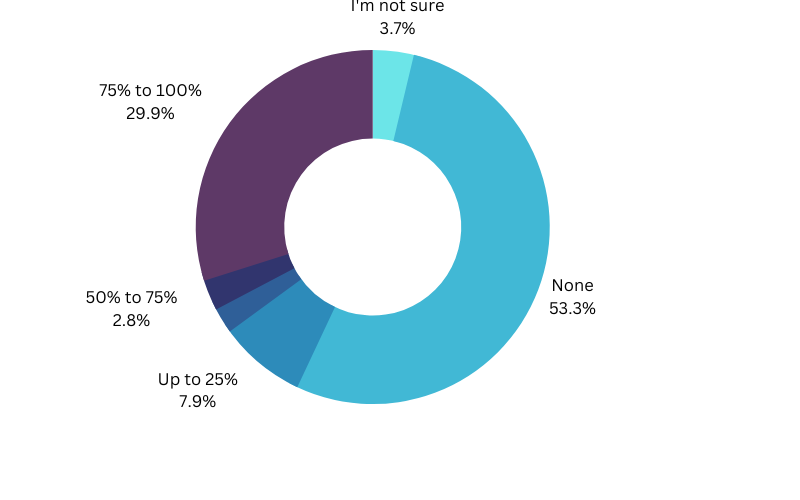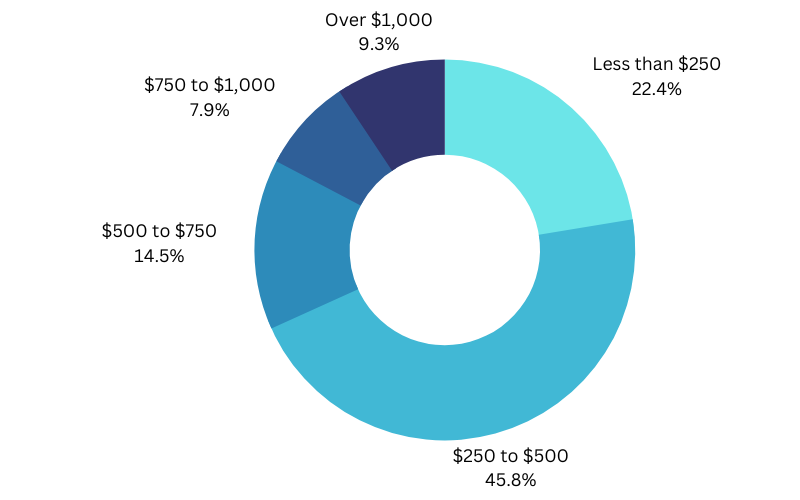Costs (10/2023)Updated 9 days ago
Dates
October 16-23, 2023
Participants
214
Results
Question #1: How much did your current scleral lenses cost, including fitting fees?

NOTE: Four participants mentioned that they have only one lens. The survey was not designed to accommodate this, and the overall impact on the numbers should be minimal.
Question #2: How much of the cost was covered by insurance?

Question #3: Approximately how much do you spend (or expect to spend) annually on supplies, such as plungers, cases, salines, cleaning solutions, mirrors, lights, etc?

Note: Several people commented that their annual costs were high due to supplemental solutions (eg artificial tears and in some cases autologous serum tears) that they are using in the bowl of the lens in addition to or in place of saline.
2023 vs 2019 - What's changed?
1. Lens/fitting cost: Somewhat better
The lens/fitting costs reported by participants were trending a little lower in 2023 than 2019. Examples:
- Patients reporting all-in lens costs of $3,000 or less: 71% in 2019, 78% in 2023.
- Patients reporting all-in lens costs of $5,000 or more: 17% in 2019, 8% in 2023.
My take is that this is not due to a decrease in costs but rather than the industry is continuing to expand and diversify and far more optometrists are fitting sclerals, so the most costly customized lenses (e.g. PROSE, EyePrintPro) now represent a smaller proportion of overall fittings.
2. Insurance coverage: Worse
Overall, insurance coverage reported by patients was significantly worse in 2023 than 2019:
- Patients reporting at least 50% insurance coverage for their sclerals dropped from 43% in 2019 to 34% in 2023.
- Patients reporting NO insurance coverage for their sclerals rose from 48% in 2019 to 55% in 2023.
This is not good news for our community and certainly echoes the sentiments in many of the participant comments. However - and this is also reflected in the discussions on the MBFSL Facebook group - there is a lot of confusion about how to obtain accurate facts about insurance coverage (and Medicare in particular) for medically necessary sclerals.
3. Annual supply costs: About the same
No significant changes showed up in people's annual costs for supplies. Two-thirds of participants are spending $500 or less on their supplies annually, about the same as in 2019.
Comments
While there were many comments about costs, I decided to share here the ones that pertained specifically to insurance coverage and/or Medicare. I'm not able to address these individually this time but it is very concerning to see the difficulties people face just getting accurate, reliable information about insurance coverage for sclerals. When the Dry Eye Foundation's scleral lens site is launched, it will hopefully be able to help fill in some gaps on this topic.
Experiences with insurance (other than Medicare)
- I carry eye insurance and medical and neither would cover the cost of the contacts.
- Insurances seem to be backtracking on what they offer on medically necessary lens. I used to have coverage w/ $0 out of pocket, but this has now changed and I now owe about $1000 to $1500 for a new pair
- I do get lenses covered by insurance but I opted to pay out of pocket for Eyeprint Pro with Ovitz HOA correction. They cost about $5500 out of pocket.
- It seems my insurance has been paying all the costs. I haven't had a bill for my lenses, only my co pay for the visits
- Senior Care Plus paid for almost everything except the lens itself
- Always request to your doctor to try to get lenses and solution covered by insurance as they are medically necessary
- VSP FOR FEDERAL EMPLOYEES COVERS MORE THAN MOST INSURANCE.
- Lenses and fitting were covered almost entirely by Kaiser but I pay for all supplies.
- I had to fight with insurance, but I ultimately got most of the cost paid.
- If your lens are deemed medically necessary, and you are over 50, the right insurance is cheap and covers 100%. Some companies vision plans cover most of the cost. Finding the right insurance can be difficult.
- The lenses and ongoing supplies are very expensive. I wish my UHC Medicare Advantage Insurance would cover more of the cost.
- I feel that since wearing scleral lenses is the result of a medical issue; they should be covered by insurance. If the people deciding what is and is not covered had to wear scleral lenses; they would be covered by insurance!
- My insurance covered for this year, but will not cover the >$2000 cost next year. Medicare does not cover any medically necessary contacts, but my vision rider does every other year. It is abhorrent that Medicare does not cover medically necessary lenses. Thankfully, we can afford it every other year, but not all can, thus suffer.
- I wear 1 lens, 100% covered by insurance. The other is a designer [custom] lens that cost me $1500 for the fitting & lens. It costs me around $650 if I replace the designer lens annually. I am unable to see or drive without the custom lens. I have had 12 eye surgeries, 9 alone on L eye that requires the custom lens.
- If my insurance wouldn't cover my medically necessary lenses for keratonconus I wouldn't be able to afford them so I believe more insurance companies should cover them 100%, no deductible applied.
- The price of scleral lenses is ridiculous and the fact that insurance doesn't cover them is even worse. Most users have medical issues that require this type of lens.
- I'm completing this for my adult daughter with Autism, she is low functioning and I am her guardian. She is not cognitively capable of understanding how to complete this survey. She is on Medicaid and our eye doc has been AMAZING. He words the rx in a way that between my health insurance and her medicaid coverage her once per year pair is almost 100% paid for. Supplies are not covered- she uses her social security money to buy those monthly.
Experiences with Medicare
- Medicare did not cover scleral lenses for Sjogrens Syndrome dry eye.
- My scleral lenses would cost so much more if I had not found a private practice ophthalmologist who has a way to code my lenses as DME and not simply contact lenses. Medicare does not charge me for these.
- I am appealing to medicare for coverage of the non covered part of my sclera lens, which is the preliminary measurements, creation of the lens itself, and the training for the patient in using the lens. If anyone has been through this experience, please send suggestions........PROS AND CONS ACCEPTED
- Medicare doesn’t pay for medically necessary lenses. My private vision plan pays only $250 each year for medically necessary lenses and my participating doctor provides a 15% discount and it still costs $1000. If you use the insurance, you can’t get glasses the same year and sometimes you need glasses while resting your eyes.
- If a person is on Medicare and has been officially diagnosed with severe dry eye (whether from Sjogren's, or some other mechanism), insurance will pay for sclerals as a dry eye reduction prosthetic - https://www.cms.gov/medicare-coverage-database/view/ncd.aspx?
- Medicare should cover this as medically necessary but they do not.
- I’m a senior with Medicare and a supplement ins. Lenses are not covered! Taxing on my income. My optometrist helps me by reducing the cost!
- Was on disability and Medicare refused to cover any cost even though the lenses allowed me to return to work. Sad how bad our system is when it comes to Healthcare!
- my scleral lenses went from $700 a pair to $2500 in one year. Why does the price almost quadruple in one year? why won't medicare pay for them? they are essential to me
- My insurance covered for this year, but will not cover the >$2000 cost next year. Medicare does not cover any medically necessary contacts, but my vision rider does every other year. It is abhorrent that Medicare does not cover medically necessary lenses. Thankfully, we can afford it every other year, but not all can, thus suffer.
- My scleral lenses would cost so much more if I had not found a private practice ophthalmologist who has a way to code my lenses as DME and not simply contact lenses. Medicare does not charge me for these. I believe the cost w/o her help would be $1500. And around a year or so, the PEG coating disappears and I need a new set. It would be such a wonderful idea if someone could establish a 'best practices' procedure for all the ophthalmology people who fit scleral lenses. By doing so, it would help many people who just cannot come up with this money, but desperately need the lenses.
- I was able to get my lens partially covered by original Medicare, but I had to appeal it three times to an administrative law judge which took about a year. Medicare does covers scleral lenses under NCD 80.5, but they rarely will pay unless you fight it.
WANT TO USE OUR SURVEY DATA?
You are welcome to use our surveys freely so long as you attribute them to THE DRY EYE SHOP and provide a link to this page.